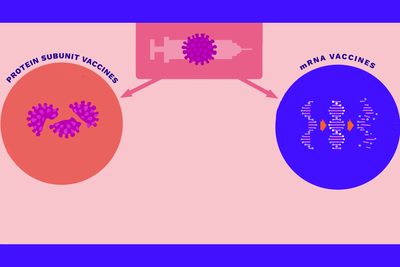Reviewed by Sabra Klein, Ph.D.
As of May 2023, 68 million Americans in the U.S. — 1 out of 5 people —- were unvaccinated against Covid-19, had not completed their primary series or had not gotten a booster dose.
Now that a few types of Covid-19 vaccines are available, experts hope more people will feel comfortable getting vaccinated.
Getting a Covid-19 vaccine isn’t a “take it or leave it situation” — you have the freedom to choose which one is right for you.
SARS-CoV-2 is the virus that causes the disease, Covid-19
Did you know?
Corona means crown, and coronaviruses are named for the crown-like spikes on their surface
How do Covid-19 vaccines work?
Coronaviruses have a crown-like spike on their surface, called spike proteins. All of the authorized and/or approved Covid-19 vaccines trigger the immune system to make antibodies against the spike protein to help fight the virus.
There are two types of Covid-19 vaccines
They work differently from one another
Step 1: Depending on the type of vaccine, it either introduces the spike protein to the body or gives the body instructions for how to make the spike protein.
Protein subunit vaccines contain spike proteins — pieces of the virus that causes Covid-19 — but since it’s not the whole virus, they’re harmless. When you’re vaccinated, nearby cells pick up the spike proteins. | mRNA vaccines teach cells how to make copies of the spike protein. After the protein copy is made, our cells break down the mRNA and get rid of it. |
Then both vaccines follow these two steps:
Step 2. The immune system realizes that the spike proteins do not belong in the body and creates antibodies to fight them off. Step 3. Once the immune system knows how to fight the spike proteins, it will be ready to respond quickly to the actual virus if you are exposed to it — and protect you from Covid-19.
Step 3. Once the immune system knows how to fight the spike proteins, it will be ready to respond quickly to the actual virus if you are exposed to it — and protect you from Covid-19.
Both types of vaccines — protein subunit and mRNA:
- Have been studied for decades
- Do not affect or interact with DNA and cannot change or influence our genes
- Do not contain live SARS-CoV-2 and cannot cause Covid-19
- Are safe, including in children
Why get vaccinated?
- Covid-19 vaccines are safe and effective at helping to protect people from getting seriously ill or being hospitalized.
- Covid-19 vaccines can offer added protection to people who have already had Covid, including preventing infection from new variants.
There is a Covid-19 vaccine that can meet your needs. Knowing your options can help you choose the Covid-19 vaccine that’s best for you and your family.
This resource was created with support from Novavax.
- Where Are You Getting Your Covid-19 Vaccine Information? ›
- 10 Vaccines Adults Should Get ›
- Covid-19 Vaccines and False-Positive Mammograms: When Should You Get Screened? ›
- Wondering if the Covid-19 Vaccine Is Safe for Your Child? ›
- Comparing the 3 Covid-19 Vaccines ›
- Options for Covid Vaccines - HealthyWomen ›
- Choose to Protect Yourself: Get Vaccinated Against Covid - HealthyWomen ›
- WomenTalk: Choose to Protect - HealthyWomen ›
- How Are Vaccines Made? - HealthyWomen ›
- Common Diseases and Their Vaccines - HealthyWomen ›


